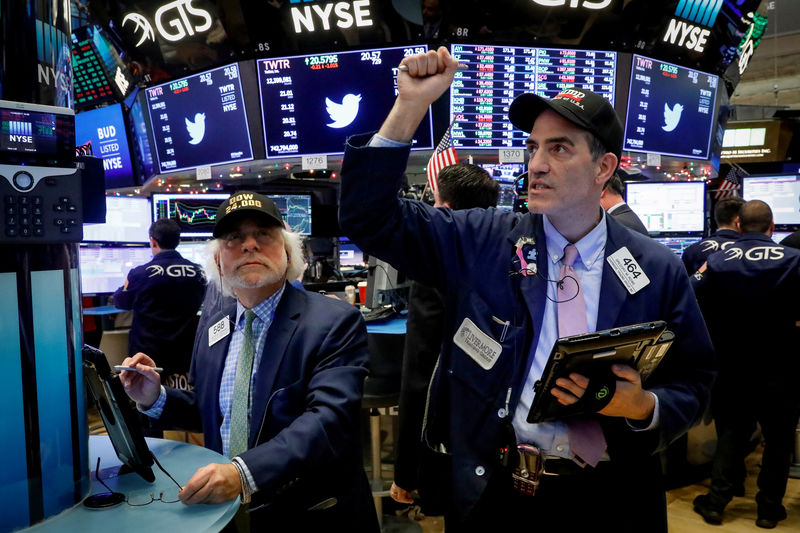By Helen Reid
LONDON (Reuters) - Shares reacted much more violently than usual to surprises in company results in the latest quarterly reporting season as investors put a laser-like focus on earnings, generously rewarding winners but mercilessly punishing laggards.
It's a phenomenon that runs counter to the generally depressed levels of volatility at the stock index level, and presents opportunities for investors in derivatives trading as well as in traditional stock-picking.
Stock markets around the world have surged to a succession of record highs this year, but, far from a rising tide lifting all boats, the gap between winners and losers is widening.
Earnings day price moves have been the most extreme on record, Goldman Sachs (NYSE:GS) strategists said, with stocks notching up 3.6 times the average daily move after results.
The sharp swings show investors are focusing strongly on individual company performance and underline the crucial importance of strong earnings.
"We have something like record low index volatility, but individual stock volatility is not low at all and we have seen a spike up in individual stock vol(atility)," Luke Ellis, CEO of Man Group, told Reuters at an investment summit.
The stock market's verdict on individual companies differed sharply, providing a "fantastic opportunity" for stock pickers to beat the index, he said.
This results season has seen blue-chip companies like General Electric (N:GE) in the United States sink 13 percent, while European investors punished both EDF (PA:EDF) and Burberry (L:BRBY) to the tune of one-tenth of their market value and Nokia (HE:NOKIA) by 18 percent on earnings day.
Companies with strong earnings have also been rewarded more than usual, correcting the negative skew seen last quarter where earnings misses were punished more severely than beats were celebrated.
"If the big move is coming from earnings then it's telling you there's a lot of exuberance about earnings growing," said Amit Khanna, head of equity research at QuantInsight.
"And if that's not the case and a company misses, you will have a lot of disappointment."
As Eric Moore, income fund manager at Miton Group put it: "When companies disappoint they're getting properly spanked. The market is in an unforgiving mood."
HEIGHTENED SENSITIVITY
Part of investors' heightened sensitivity is because earnings have been the driving force behind stock markets' stellar gains this year - and are expected to drive risk appetite through 2018.
"2018 is going to be a perfectly decent year for risk assets, on the assumption we get another decent year of profit growth," Standard Life's head of global strategy, Andrew Milligan, told Reuters last week. "Profits are still the be-all and end-all for the coming year."
The majority of returns in equities this year have been driven by earnings rather than by the value of a company growing through improved performance, Credit Suisse (SIX:CSGN) figures showed.
In Europe year-to-date, gains have been almost entirely earnings-led - with 85 percent of returns driven by growth in earnings per share. In emerging markets that figure is 70 percent while the United States owes 50 percent of its returns to earnings, the Credit Suisse figures show.
Knowing that returns are so highly dependent on companies' bottom line, investors have been ruthless. While the shares of tantalizingly fast-growing companies have skyrocketed this year, investors' patience with mediocre results has run thin.
The phenomenon could also be linked to investors piling into equities, NN Investment Partners CIO Valentijn van Niewenhuijzen said.
Global investors' allocation to equities rose to a net 49 percent overweight in November, the highest since April 2015, Bank of America (NYSE:BAC) Merrill Lynch's (BAML) fund manager survey showed.
Higher stock volatility has not translated into greater average index volatility, partly because the large earnings-day moves were often corrected the following day.
"Investors have been very, very quick to buy the dip and that's equivalent to fading the volatility spikes, which therefore have not been very long-lived," said Abhinandan Deb, EMEA head of equity derivatives at BAML.
(Earnings drive lion's share of returns across markets: http://reut.rs/2zZWsZr)
Confidence in the underlying economic growth driving the market put the brakes on any drawn-out sell-offs in stocks.
All of this adds up to a perfect environment for stock-picking, a boon for active managers fighting to win back flows which have been pouring into exchange-traded funds (ETFs) and other passive vehicles this year.
"The opportunity set for making money from stock-picking is higher than it's been before," said Deb.
SIGN OF STRAIN?
Goldman Sachs strategists, who observed this pattern in Europe and the United States, said skittishness in stocks on earnings days, combined with generally calmer moves outside of results, was a sign of increased uncertainty under the surface.
Data from the bank's U.S. strategists shows a rise in single stock volatility is generally associated with a decline in equity returns.
"While they do not believe this is a reason to sell the market (or buy VIX (the Chicago Board Options Exchange Volatility Index)) it is certainly a trend to be monitoring closely," Goldman strategists wrote.
Rather than worrying about volatility affecting returns, some investors have taken advantage of the phenomenon to reap returns in derivatives markets.
Investors piled into a "dispersion trade" this year, buying stock volatility and selling index volatility. This relative trade bets on stock correlations falling while hedging against the possibility that volatility might remain low.
"This strategy has been very popular this year, with strong volumes traded on the EuroSTOXX 50 and the S&P 500 by hedge funds and asset managers," said Kokou Agbo-Bloua, global head of flow strategy at Societe Generale (PA:SOGN).
It is also a less costly strategy than being outright long volatility, Agbo-Bloua added.
As market volatility starts to show signs of life, investment vehicles tracking lower volatility stocks have also been performing better. Fidelity's low volatility factor ETF (K:FDLO) made its strongest gains in nine months in November.
"In a rising volatility environment, there is likely to be demand for low volatility assets (which become scarcer)," Goldman strategists said.
